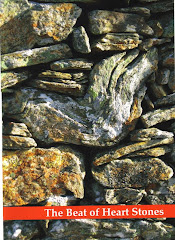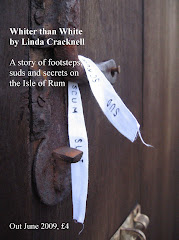
Last year a small group of us who are members of
Scottish PEN -- and therefore either writers, or professionally engaged with literature -- set up a new online magazine. For each issue (now two a year) we propose a theme, and invite submissions from Scottish PEN members, and from people living in Scotland who are either writers in exile, or who are non-native English speakers trying out writing in English; often refugees or asylum seekers.
It's been a fascinating process, selecting work from the submissions, then seeing how the pieces chime with each other and flavour the magazine with the places and experiences they evoke.
PENning Water, the current issue, has been one of the most exciting in terms of quantity and diversity of response. Writers from Scotland, Zimbabwe, Shetland, Pakistan, Congo, Syria, and Sri Lanka take us on a journey through watery celebrations, transformations, memories and fears in poetry and prose.
In each issue we also
feature a piece from a writer who works in some way with PEN and who brings a unique international perspective on writers and writing. So far, amongst others, we've featured Chew-Siah Tei, writing about her experience of the
Jessie Kesson residency on the snowy hilltop at Moniack Mhor; and Philo Ikonya, writing about reinvigorating PEN Kenya in recent years, and the kind of problems writers are up against there, which we do not experience in Britain.
In the current issue Aminatta Forna has written for us about writers in Sierra Leone as they recover from war. I remember once talking to someone who worked with seriously traumatised people in refugee camps around the world. He told me that what these people talk about tends not to concern their recent traumas but focuses on the superficial, such as who fancies who. In her piece, 'Love stories', Aminatta charts the preoccupations of writers gathered together in PEN’s name in Sierra Leone, and what has inspired their subject matter over the last ten years as the trauma of war continues to resonate.
Aminatta's most recent novel
'The Memory of Love' is one of the best I've read this year -- moving, beautifully written, and remarkable for its penetration of the minds of both European and African characters. As her website describes, it ‘transports us to an African city, where a dying man Elias Cole, reflects on a past obsession: Saffia, the woman he loved, and Julius, her charismatic, unpredictable husband. Arriving in the wake of war Adrian Lockheart is a psychologist new to this foreign land, struggling with its secrets and the intensity of the heat, dust and dirt, until he finds friendship in Kai Mansaray, a young colleague at the hospital. All three lives will collide in a story about friendship, love, war, about understanding the indelible effects of the past and the nature of obsessive love.’ Read
reviews here.
What I love about my involvement with PEN is a sense of connection and solidarity with a whole world of writers and with issues that really matter to freedom of expression. PEN has taken me on journeys to Senegal (pictured above: writers gathered on Goree Island during the PEN Congress 2007) and Kenya, and further through the literary conveyance of imagination. For me it’s about being a writer with a global interest and conscience, a reaching out to other writers and literatures.
Are you a writer or literature professional in Scotland and not a
member of PEN? Please consider joining. Oh, and get writing, the next issue is
PENning Courage.
 I've been lucky enough to spend two consecutive weeks recently in houses dedicated to words and writing: Tŷ Newydd in Wales and Moniack Mhor in the Scottish Highlands. Each is distinct in feel, position and location, Tŷ Newydd, once home to Lloyd George, a white house gracing a lawn looking out over Cardigan Bay; and Moniack Mhor a croft house clinging onto a gusty hilltop in Invernessshire. But both provide a calm and creative atmosphere which gets imaginations whirring and pens scribbling (or keyboards chittering).
I've been lucky enough to spend two consecutive weeks recently in houses dedicated to words and writing: Tŷ Newydd in Wales and Moniack Mhor in the Scottish Highlands. Each is distinct in feel, position and location, Tŷ Newydd, once home to Lloyd George, a white house gracing a lawn looking out over Cardigan Bay; and Moniack Mhor a croft house clinging onto a gusty hilltop in Invernessshire. But both provide a calm and creative atmosphere which gets imaginations whirring and pens scribbling (or keyboards chittering).  Both houses offer residential writing courses, (and it's worth knowing they also have bursaries that can be applied for to help with costs). I was at Tŷ Newydd to tutor a short story course with Sara Maitland with a grand group of writers: an intimate, hard-working, serious and hilarious week. At Moniack Mhor I was working each day with a different group of children from local primary schools, exploring the wildlife of Abriachan Forest in the mornings and capturing some of the wonder into words in the afternoons. The sense of application was palpable in both locations, and in long, light evenings at Moniack, I plugged into the creative breezes and wrote at this gorgeous window desk myself.
Both houses offer residential writing courses, (and it's worth knowing they also have bursaries that can be applied for to help with costs). I was at Tŷ Newydd to tutor a short story course with Sara Maitland with a grand group of writers: an intimate, hard-working, serious and hilarious week. At Moniack Mhor I was working each day with a different group of children from local primary schools, exploring the wildlife of Abriachan Forest in the mornings and capturing some of the wonder into words in the afternoons. The sense of application was palpable in both locations, and in long, light evenings at Moniack, I plugged into the creative breezes and wrote at this gorgeous window desk myself.  It raises the question for me of how the location of the writer affects the writing. Are some places better for the playful hatching of ideas (a busy cafe perhaps?), some for consolidated writing, some for revision? I've recently become a trustee of a piece of community-owned land close to home - a hill, Dun Coillich, that rises up one of the high flanks of Schiehallion. A hut is perched on its lower slopes, and it seems to call out for a writer to occupy it. Perhaps at certain stages, the view would be too much of a distraction, but I will be climbing that hill to it, inspired by thoughts of great writers who've famously made creative retreats in huts. I have to confess my own custom-built writing hut appeals to me, though mine would have to a) be heated, and b) rotate during the day to catch the natural light, just as George Bernard Shaw's did.
It raises the question for me of how the location of the writer affects the writing. Are some places better for the playful hatching of ideas (a busy cafe perhaps?), some for consolidated writing, some for revision? I've recently become a trustee of a piece of community-owned land close to home - a hill, Dun Coillich, that rises up one of the high flanks of Schiehallion. A hut is perched on its lower slopes, and it seems to call out for a writer to occupy it. Perhaps at certain stages, the view would be too much of a distraction, but I will be climbing that hill to it, inspired by thoughts of great writers who've famously made creative retreats in huts. I have to confess my own custom-built writing hut appeals to me, though mine would have to a) be heated, and b) rotate during the day to catch the natural light, just as George Bernard Shaw's did.







